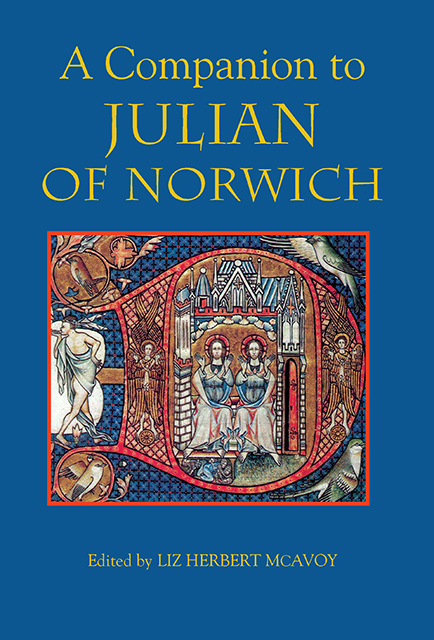7 - Julian of Norwich and the Liturgy
Published online by Cambridge University Press: 10 March 2023
Summary
At the very outset of the Short Text of her Revelations, Julian of Norwich tells us:
I desirede thre graces be the gifte of God. The first was to have minde of Cristes passion. The seconde was bodelye syekenes. And the thrid was to have of Goddes gifte thre woundes. (Vision, 1.1–3)
Within the context of late medieval affective spirituality, the first of these requests seems entirely conventional, yet Julian positions it explicitly outside the devotional framework of the Church:
Notwithstandinge that I leeved sadlye alle the peynes of Criste as halye kyrke shewes and teches […] noughtwithstondinge alle this trewe beleve, I desirede a bodilye sight, wharein I might have more knawinge of bodelye paines of oure lorde oure savioure. (Vision, 1.9–14)
Although the second request is expressed in extreme terms (‘I wolde that this bodilye syekenes might have beene so harde as to the dede’: Vision, 1.21–2) and is without exact contemporary parallel, in its emphasis on physical mortification it does not sound entirely out of keeping with the trends of contemporary spirituality. Julian, however, is quick to tell us that:
This two desires of the passion and of the seekenes, I desirede thame with a condition. For methought that it passede the comene course of prayers. (Vision, 1.30–1)
She does not apply this ‘condition’ to her third request (for the wounds of ‘contrition’, ‘compassion’ and ‘wilfulle langinge to God’: Vision, 1.40–1) and that she does not claim her desire for this third grace ‘passede the comene course of prayers’ is perhaps because the states of contrition, compassion and the longing for God are such staples of the late medieval devotional life.
According to Julian, however, a visionary experience of the Passion beyond the ‘techinge of haly kyrke’ and a physical illness ‘so harde as to the dede’ cannot be defined by the terminology of contemporary devotion. Nor, she infers, can her desire for these graces be judged to fall within the boundaries of ‘comene’ intercessory practice. It is precisely this relationship between Julian's visionary experience and the patterns of contemporary prayer (specifically liturgical and quasi-liturgical) which I explore in this essay, suggesting that, while wider intercessory and meditative practices can shed some light on Julian's literary and liturgical affinities, there are inevitably aspects of her devotional life and language which remain idiosyncratic and enigmatic.
- Type
- Chapter
- Information
- A Companion to Julian of Norwich , pp. 88 - 98Publisher: Boydell & BrewerPrint publication year: 2008
- 3
- Cited by



